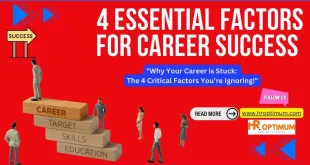Spending about 8 hours a day at work is a big part of our lives. It’s key to find a job that makes us happy and fulfilled. Career development helps us make sure we’re on the right path. Finding your perfect career can greatly improve your life satisfaction.
Many people are not in their dream job, with over 80% feeling unhappy at work. This shows we need good career development strategies to find job satisfaction.
Doing brainstorming exercises and career tests can help you find your strengths and interests. This leads to a more fulfilling career. By knowing what you enjoy and what frustrates you, you can make better career choices. This is important for career development and job satisfaction.
Key Takeaways
- Spending a significant amount of time at work can lead to dissatisfaction if the job is not fulfilling, stressing the need for career development.
- Career assessment tests and brainstorming exercises can help identify your strengths and interests, leading to a perfect career and job satisfaction.
- Understanding your values, skills and what the world values is key for finding a fulfilling career and achieving career development.
- Networking and seeking career guidance from counselors or mentors can boost career opportunities and job satisfaction.
- Emotional stress can come from a career that doesn’t match your interests, showing the importance of finding your perfect career through effective strategies.
- Research shows finding meaning in work is vital for job satisfaction, and career development is a big part of this, leading to a perfect career.
1. Understanding Your Career Personality Type
Finding a fulfilling career starts with knowing your career personality type. Studies show that people who match their career with their personality type feel more successful. Personality assessments like the Myers-Briggs Type Indicator (MBTI) can reveal your strengths and weaknesses.
Holland’s Theory breaks down six main personality types: Realistic, Investigative, Artistic, Social, Enterprising, and Conventional. Each type has its own work style preferences. For instance, Realistic types like hands-on work, while Investigative types prefer research.
Knowing your personality type helps you understand your work style. This includes how you communicate and solve problems. This self-awareness guides you in choosing the right career path and work environment. By using professional personality assessments, you can learn more about your career personality type.
Here are some important points to keep in mind when exploring your career personality type:
- Identifying your strengths and weaknesses
- Understanding your work style preferences
- Exploring different career paths and industries
- Developing a growth mindset to adapt to changing career landscapes
2. Mapping Your Skills and Talents
As you move forward in your career, it’s key to map your skills and talents. This helps you see where you shine and where you might need to work harder. Skills mapping is vital for talent development and career growth. It lets you know your strong points and areas for improvement, guiding your career choices.
Studies show that companies that map skills keep their best workers longer. They also handle changes better. By mapping your skills, you can spot where you need to learn more. This is key for career growth and talent development.
Skills mapping offers many benefits, such as:
- Improved resource allocation and training needs
- Enhanced employee engagement and productivity
- Better alignment with business goals
- Support for succession planning
By focusing on skills mapping, you’ll understand your strengths and weaknesses better. This leads to more effective career growth and talent development. Remember, career growth is ongoing. Skills mapping is a key tool for reaching your goals.
3. Aligning Your Career Choice with Personal Values
Choosing a career is deeply connected to personal values. Research shows that jobs that match our core beliefs make us happier and more productive. In fact, 71% of workers would take a pay cut to work for a company that shares their values.
Finding a good work-life balance is key to a happy career. This balance helps reduce stress and boosts mental health. Knowing how your career aligns with your values helps you make better choices and succeed.
- Identify your core values and passions
- Understand your work style and needs
- Look for companies that share your values and support a healthy work-life balance
By focusing on your personal values, you can build a rewarding career. This career will match your goals and dreams.
4. Exploring Different Career Paths and Industries
Starting your career exploration journey means looking at the latest industry trends and the job market. This helps you make smart choices about your career path. It also boosts your chances of success.
Key industries to check out include Agriculture, Environment & Sustainability, Arts, Communication, Media & Design, and Technology, Engineering & Data. Each offers various career paths and growth opportunities.
When looking at different careers and industries, think about these things:
- Job outlook and growth prospects
- Required skills and qualifications
- Salary ranges and benefits
- Work-life balance and company culture
By researching and exploring different careers and industries, you learn more about the job market. This helps you make informed career choices. Always keep up with the latest industry trends and be ready for new opportunities and challenges.
5. Building Your Professional Network for Career Guidance
As you move through your career, a strong professional network is key. It offers career guidance and support. This network includes industry experts who can give advice, mentor you, and connect you to new chances. To grow your network, take part in professional networking like attending events, joining groups, and using LinkedIn.
Here are some ways to build your network:
- Reach out to industry experts for advice or interviews.
- Go to professional events, conferences and seminars to meet others in your field.
- Use LinkedIn to connect, join groups, and share in discussions.
By putting time and effort into your network, you open doors to career guidance, jobs, and mentorship. Always be ready to help others and learn from their experiences and knowledge.
6. Creating Your Ideal Career Roadmap
To reach your career goals, making a career roadmap is key. This means career planning and goal setting. These steps keep you focused and motivated. A clear roadmap helps you make smart career choices and boosts your success chances.
A career roadmap is a plan tailored to you. It outlines your career goals, strategies, and when you want to achieve them. It shows your strengths, weaknesses, and opportunities. This way, you can make sure your career matches your values, interests and skills.
Here are some perks of having a career roadmap:
- Increased job satisfaction and engagement
- Improved retention rates and reduced turnover
- Enhanced employer brand and attractiveness to top talent
- More effective talent management and succession planning
Studies show that 70% of workers value a clear career path for job happiness. Also, 94% of employees would stick with a company that invests in their growth. By making a career roadmap, you can steer your career and hit your targets.
Conclusion: Taking Action Toward Your Dream Career
Finding the perfect career is a journey of self-discovery and planning. By knowing your personality, skills and values, you can pinpoint your dream career. Then, create a career action plan to make it happen. Remember, the path to job satisfaction is through action, not just dreams.
Use what you’ve learned to confidently move through the job market. Build a strong professional network and keep improving your skills. Career choices can change often, with the average person switching at least once in their life. With determination and a flexible mindset, you can turn your career aspirations into a fulfilling reality.
FAQ
Why is finding the perfect career so important?
Working a lot of hours can make you unhappy if you don’t love your job. It’s key to find a career that matches your values, skills, and what the world needs.
How can understanding your career personality type help you find a fulfilling career?
Knowing your career personality type helps you see your strengths and weaknesses. This knowledge guides you to a career that fits you well.
What is the importance of mapping your skills and talents?
Mapping your skills and talents shows you what you’re good at and what you need to work on. It helps you find a career that suits you.
Why is it important to align your career choice with your personal values?
Choosing a career that matches your values is vital. It ensures a good work-life balance and helps you avoid jobs you’ll hate.
How can exploring different career paths and industries help you find your perfect career?
Looking into various careers and industries gives you the info you need to make a smart choice.
What are the benefits of building a professional network for career guidance?
A professional network offers advice and insights from industry experts. It’s useful for career guidance and growth.
How can creating an ideal career roadmap help you achieve your career goals?
A career roadmap helps you set and reach goals. It keeps you focused on your dream career.
 Hroptimum Leading to Success
Hroptimum Leading to Success




